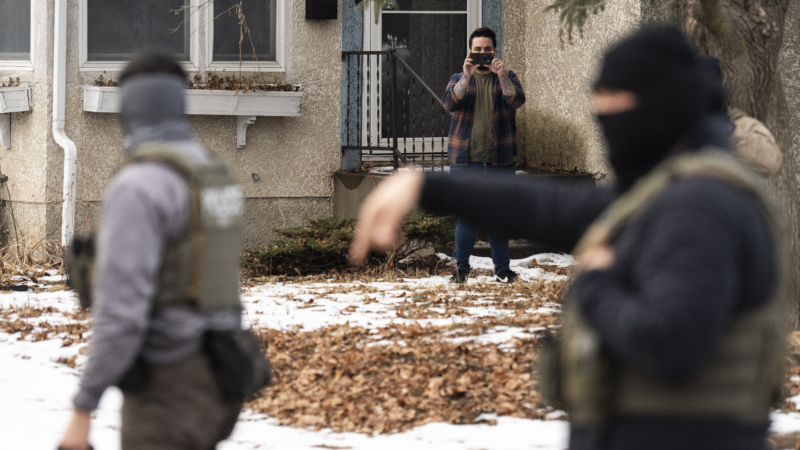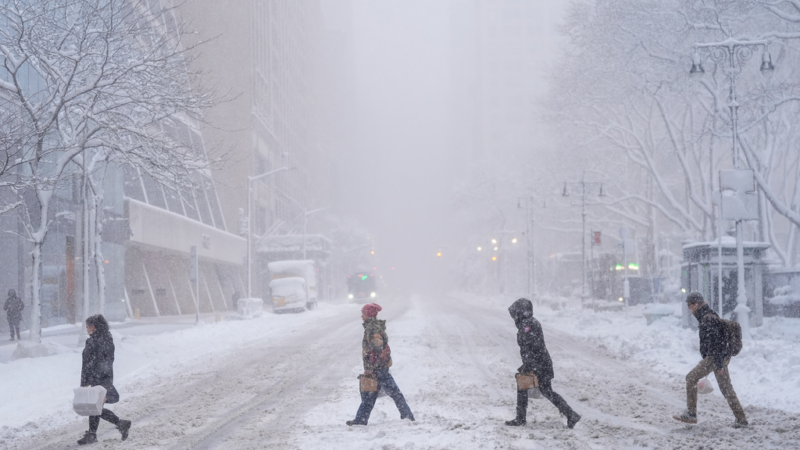ICE tried to send one immigrant to a country he never lived in. Then he lawyered up.
Samantha Surovtsev met her husband, Roman Surovtsev, in 2017 while jet skiing.
When they started dating, Surovtsev was honest about his past. He told her that he had come from the former Soviet Union as a refugee at the age of four. And that when he was a teenager, his green card was revoked after pleading guilty to carjacking and burglary charges in California.
He explained that after being released from prison, in 2014, he spent time in Immigration and Customs Enforcement custody while they tried — and failed — to deport him to Ukraine and Russia.
Both countries, according to legal filings reviewed by NPR, could not provide or confirm Surovtsev’s citizenship since he left before the fall of the Soviet Union. They couldn’t give him the travel documents needed for deportation.
Since then, each year, Roman Surovtsev did a check-in with ICE.
In the meantime, the Surovtsevs’ lives followed the path of thousands of immigrants in the U.S. who are considered stateless. They got married, had kids, and launched a small commercial painting business in Texas.
Then, one day in early August, what should have been a 10-minute errand at a kiosk at the Dallas ICE field office for one those regular check-ins turned into 30 minutes of waiting in the parking lot, “praying that he wouldn’t be detained,” his wife told NPR.
“There were tears involved, just not knowing what was on the other side of that appointment,” Samantha Surovtsev recalled. Then she got that call: “I panicked. I panicked because it said, ‘This is a call from a detainee.'”
Roman Surovtsev joined the trend of others who are detained at their regularly scheduled check-ins with ICE, to meet the administration’s one-million-person annual deportation target.
The “human element”
What makes his case different is that his wife has marshalled a team of lawyers on his behalf. Unlike hundreds of others the Trump administration has vowed to deport as part of its mass deportation goal, Surovtsev has a chance to make his case in front of a judge.
“People need to understand that there’s a human element involved with immigration, that every story is unique,” his wife said. “Every case deserves to be heard in front of a judge. This is not a black-and-white situation.”

According to the Surovtsevs’ lawyers and court filings, ICE has been trying for a second time to deport Roman to Ukraine, which does not have the documentation to prove his citizenship and could draft him into armed conflict. In court filings, his lawyers argue his re-detention is unconstitutional since there’s been no change to make it easier to deport him to his place of birth and that there is “not a significant likelihood that Roman would be removed in the reasonably foreseeable future.”
The absurdity of his situation was highlighted at the Bluebonnet Detention Center in Texas. The north Texas detention site, which was over its population capacity this summer, also housed Venezuelan migrants.
Surovtsev was given deportation travel paperwork in Ukrainian, according to a court declaration from Zachery Hagerty, the deportation officer processing Surovtsev. Surovtsev, who is fluent in English, does not speak or read Ukrainian.
In court filings, the Justice Department, which argues these cases on behalf of the government, said that the re-detention is legal because the agency has once again requested new travel documents from Ukraine.
Hagerty in his declaration said he believes Surovtsev could at least be deported to a third country, if not Ukraine.
The Department of Homeland Security didn’t respond to a request for comment about his specific case.
In the meantime, his legal team has successfully vacated his carjacking criminal conviction, arguing that he was not informed of the consequences to his immigration status when he originally pleaded guilty as a teen.
“It’s not a complex question. It’s not a discretionary issue,” said Eric Lee, a partner at the law firm Lee and Godshall-Bennett, one of the firms handling the case. “He’s going to get his green card back in a matter of time, which only makes it all the more callous and absurd that the administration continues to try and remove him to a country to which removal is effectively going to be a death sentence.”
Navigating due process
In the more than two months that Surovtsev has been in detention, he has missed his wedding anniversary, his wife and daughter’s birthdays and his mother’s recent health issues. His wife, Samantha, has had to cancel about two months’ worth of jobs for their painting business and their two employees are out of work.
Every day, she told NPR, she turns down about five work leads, letting customers know that there is a family emergency. She has instead spent her time working with several attorneys across the country to vacate her husband’s conviction, reinstate his green card and release him from detention.
Immigration advocates have argued that the Trump administration’s rapid approach to increase arrests and removals reduces the limited due process immigrants get. That due process is in part to minimize the chances of mistakes and prevent someone from being removed when they may have valid claims to stay, they said.
Lawyers say the Trump administration has taken steps to undermine due process. Earlier this year, the president said it wasn’t possible for all the people he wants to remove to get a trial.
Immigration officers have been told to make arrests in court, even as judges told immigrants to come back to their case. And the Homeland Security Department has mandated that immigrants be detained while undergoing their proceedings, with such detention as mandatory for those who entered without legal status.
“Yet there are lots of people in this situation. And there have been several habeas cases filed over the summer on very similar facts regarding re-detention,” said Chris Godshall-Bennett, a constitutional and civil rights attorney and another of Surovtsev’s lawyers, referring to the legal avenue for people to claim their detention is unlawful.
The process can be slow, and most people in immigration detention and in immigration court do not have legal representation to argue the particulars of their cases. Lee, the other attorney on Surovtsev’s case, said this process shows that the government is trying again to do something it can’t: deport Surovtsev to Ukraine.
“The danger here is not simply that people will be sent somewhere wrongly. The danger is that the government is going to do it on purpose in a way that disregards those protections,” Lee said. “By disregarding those protections for a subset of individuals, it has opened the door to disregarding them. Period.”
Transcript:
SCOTT SIMON, HOST:
The Trump administration wants to deport a million people a year and is placing tens of thousands in immigration detention. As part of the strategy, immigration officers are arresting and detaining those whom the government had previously tried and failed to deport. NPR’s immigration policy reporter, Ximena Bustillo, has been following the case of one such detainee.
XIMENA BUSTILLO, BYLINE: Samantha Surovtsev met her husband, Roman, in 2017, while jet skiing that summer when they started to date.
SAMANTHA SUROVTSEV: He told me about his past and his convictions, and, of course, I had a lot of questions.
BUSTILLO: When he was a teenager, Surovtsev pleaded guilty to carjacking charges. He spent a few years in prison, and the green card he had received after coming to the U.S. as a young refugee from the former Soviet Union was revoked. When he was released in 2014, he was handed to Immigration and Customs Enforcement.
SUROVTSEV: He told me, around that time, that he had spent time in ICE detention. He was a stateless person and that he couldn’t be deported anywhere but checks in every year.
BUSTILLO: The Surovtsev’s lives followed the path of thousands of immigrants in the U.S. who are considered stateless. They got married, had kids and launched a small commercial painting business in Texas. But after President Trump won the election and there were reports of immigrants being detained at their check-ins, the couple started to worry.
SUROVTSEV: There was also fears about detention. Where would he be? How would I be able to contact him? Could I contact him? There were so many unknowns that I could barely function. I was just shaking, fearful, crying. And I’m trying to keep it together for my kids’ sake so that they wouldn’t know what was going on. It was really hard.
BUSTILLO: The morning of the appointment, they arrived early.
SUROVTSEV: He doesn’t even check in with an officer anymore. He was downgraded to a kiosk because of his situation. It was just basically verifying your information and then walking out. But after about 10 minutes had passed, I knew something else was going on.
BUSTILLO: Roman Surovtsev was detained that day at the Dallas ICE field office and eventually transferred to the Bluebonnet Detention Center in north Texas. His wife, Samantha, lawyered up. And since he was detained, lawyers have successfully vacated the carjacking conviction, setting Roman on a path to get his green card back. But they say ICE is still trying to deport him to Ukraine, a country that has not provided any travel documents to return him and is in active war with Russia. Here’s Eric Lee, a partner at one of the law firms handling the case.
ERIC LEE: He’s going to get his green card back in a matter of time, which only makes it all the more callous and absurd that the administration continues to try and remove him to a country to which removal is effectively going to be a death sentence.
BUSTILLO: Court filings reviewed by NPR showed that ICE tried to provide documentation to Roman, but in Ukrainian, a language he does not speak. Chris Godshall-Bennett, a constitutional and civil rights attorney on the case, said Surovtsev is not the only one detained after ICE had let them go.
CHRIS GODSHALL-BENNETT: There are lots of people in this situation, and there have been several habeas cases filed over the summer on very similar facts, a re-detention.
BUSTILLO: Habeas is the legal avenue for people to claim that their detention is unlawful. In court filings, ICE argues that he can be detained because they’re trying to get the travel documents for Ukraine. In many ways, Surovtsev’s case is unique. Not everyone has this level of legal representation, for example. But in other ways, his case highlights what his wife said every immigrant should have, the due process to argue that they should stay. Here is Samantha.
SUROVTSEV: People need to understand that there’s a human element involved with immigration, that every story is unique. Every case deserves to be heard in front of a judge. This is not a black-and-white situation.
BUSTILLO: In the more than two months that Surovtsev has been in detention, he’s missed his wedding anniversary, his wife and daughters’ birthdays and his mother’s recent health issues. ICE did not respond to NPR’s request for comment on Surovtsev’s detention, and he remains there while he navigates this complicated legal landscape.
Ximena Bustillo, NPR News, Washington.
The FDA creates a quicker path for gene therapies
The Food and Drug Administration aims to evaluate treatments for rare diseases based on plausible evidence that they would work — without requiring a clinical trial first.
BAFTAs apologize after guest with Tourette syndrome uses racial slur during ceremony
A man with Tourette syndrome shouted a racial slur and other offensive remarks during the BAFTA awards ceremony Sunday. The BBC did not edit out his outbursts in its delayed broadcast.
‘Everything was in pieces:’ Lindsey Vonn describes grueling surgery on broken leg
In a recent video, the Olympic skier credits her surgeon with saving her leg from potential amputation.
A new lawsuit alleges DHS illegally tracked and intimidated observers
Observers watching federal immigration enforcement in Maine who were told by agents they were "domestic terrorists" and would be added to a "database" or "watchlist" are now part of a new federal class action lawsuit.
Kate Hudson on regret, rom-coms and finding a role that hits all the notes
Hudson always wanted to sing, but feared it would derail her acting career. Now she's up for an Oscar for her portrayal of a hairdresser who performs in a Neil Diamond tribute band in Song Sung Blue.
A powerful winter storm is roiling travel across the northeastern U.S.
Forecasters called travel conditions "extremely treacherous" and "nearly impossible" in areas hit hardest by the storm, and air and train traffic is at a standstill in many parts of the region.








